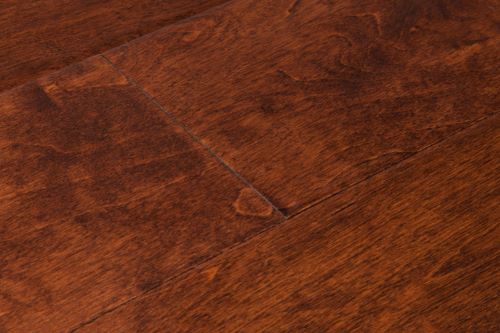Engineered hardwood flooring offers owners the best of both worlds -- beautiful and durable hardwood surfaces with an engineered substrate for strength and water resistance. Here are some facts and information about engineered hardwood you may want to know before you choose your next floor.
Is engineered hardwood the same as laminate?
No, they are different. Engineered hardwood flooring consists of a hardwood top veneer with plywood or synthetic material substrate for strength and water resistance. Laminate contains four layers including a particleboard substrate, a design or print layer which gives it the look of wood, and a wear layer on top to protect the printed layer. There is no hardwood veneer used on a laminate floor.
What is engineered hardwood?
Engineered hardwood is a durable product with a real hardwood veneer attached to a strong and durable sub-layer. While some engineered hardwood flooring uses plywood underneath, a new exciting variation is the use of a stone-plastic composite (SPC) sublayer which is completely waterproof. These engineered floors can be used in kitchens or bathrooms where other engineered floors and laminates may not be suitable. Many engineered floors now have a pre-installed underlayment of cork or foam for noise reduction and to absorb small areas of the subfloor that aren’t level.
Can I refinish engineered hardwood floors?
That depends. Only refinish an engineered hardwood floor if the manufacturer states it is designed to be refinished. Some hardwood veneers are too thin to be sanded and refinished and the floor will be damaged.
What are the advantages of engineered hardwood floors?
- They are less expensive than solid hardwood
- Every piece is unique since this is real hardwood and not a printed floor
- Engineered hardwoods are moisture resistant, and if using an SPC core are waterproof
- SPC-core engineered hardwoods can be installed in wet areas such as kitchens or bathrooms
- Many engineered hardwoods use a click-lock design which is great for do-it-yourself projects
What are the disadvantages of engineered hardwoods?
- Some engineered hardwoods must be glued or nailed down, making them less DIY-friendly
- They are veneers rather than solid hardwoods which may have less aesthetic appeal
- Since they are veneers you may not be able to refinish them later, making them less suitable for high-traffic areas
Where can I use engineered hardwood flooring?
Almost anywhere you want, including kitchens, baths, mudrooms, living rooms, basements and so forth. Make sure your engineered floor has the synthetic SPC core so it will be waterproof. SPC-cored hardwoods can even survive standing water for a time, so don’t worry if your basement gets wet on occasion.
Before you go anywhere else, shop TongueandGroove.com for all your engineered hardwood or other flooring needs. For questions or sales assistance please call 800-689-9006.



